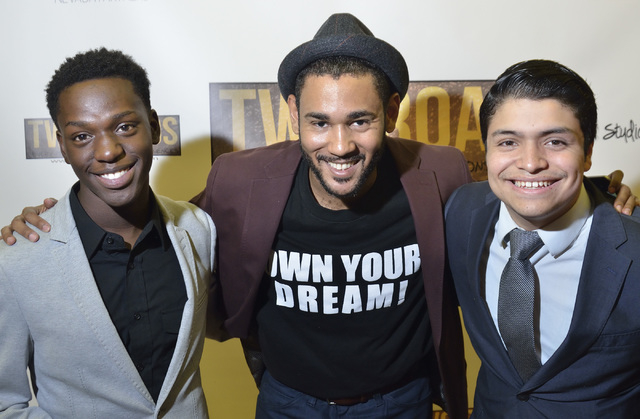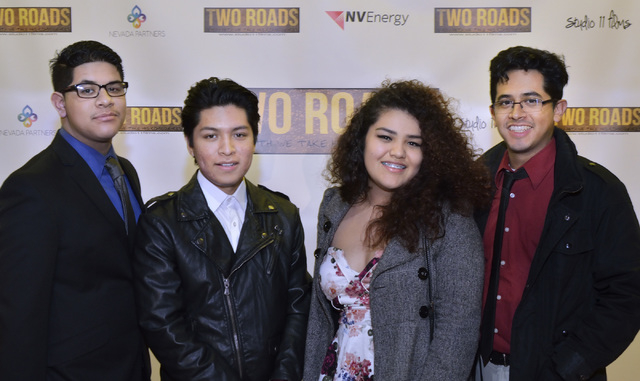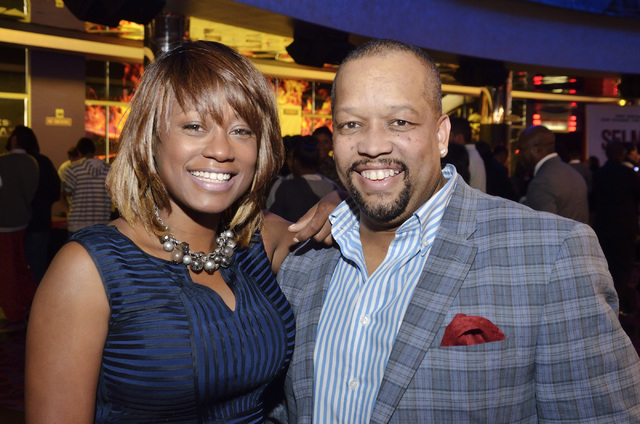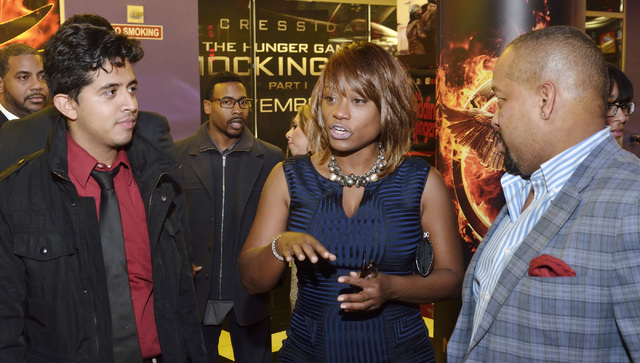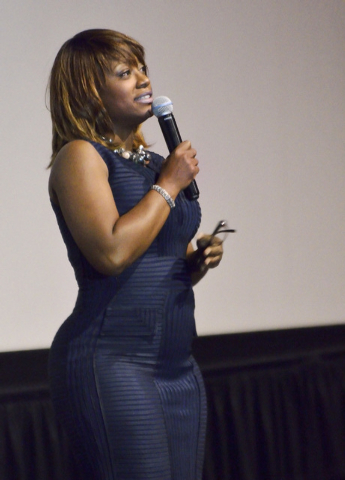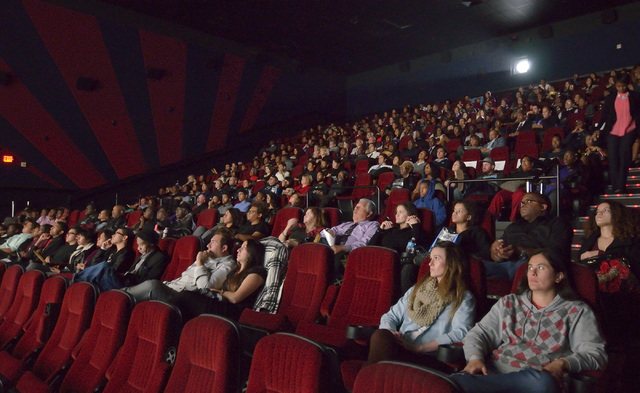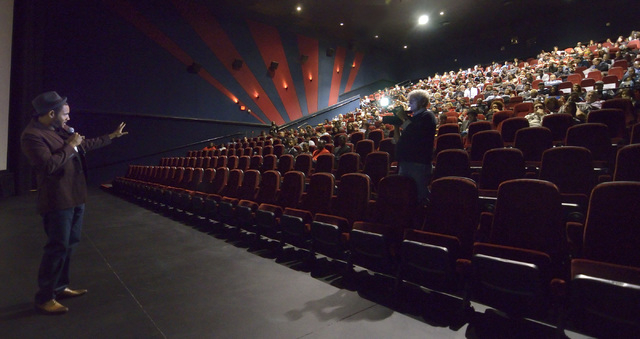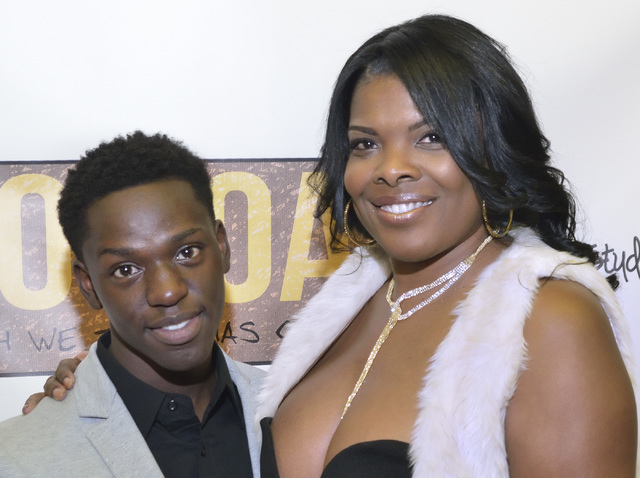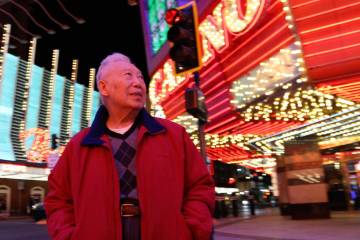Students learn firsthand the power of film
The lobby of Brenden Theatres at the Palms was bustling as people waited for the premiere of “Two Roads” on Dec. 17.
An Atlanta-based production company, Studio 11 Films, and the work development agency Nevada Partners had worked hard to bring this movie together, and now was the time to show the final results.
“Two Roads” is about a black teenager who registers to vote after turning 18. That action leads him to the potential of jury duty. The film took on added relevance after a summer of unrest over police brutality and the grand jury system.
While many in the crowd, which included politicians, law enforcement and community organizers, were eager for the movie to begin, it was nine youths in particular who were excited to see the final product.
During the summer of 2014, the nine worked in a pilot program designed by the two organizations to give young people skills in the movie industry.
“Many of them were bitten by the (film) bug,” says Avery O. Williams, the movie’s director and professor at Morehouse College who helped mentor students in the program.
The culmination of the night came from Studio 11 Films, which was founded by Sharon Tomlinson.
In 2011, Tomlinson and partner Cameron H. Miller, a Las Vegas resident who travels to Atlanta for production work, founded the 11Eleven11 Project, which invites youth to learn the ins and outs of the film industry by making 11 films in 11 weeks.
Tomlinson says the main goal of the 11Eleven11 Project is to help aspiring filmmakers gain the skills to produce television and movie projects.
The first season of the program focused on film production, while the second season was about television.
“We’ve been able to fine- tune the program each time around,” Tomlinson says.
Looking into the third year, Miller says he wanted to bring the program to youths in Nevada.
After connecting with Nevada Partners, which provides workforce development, housing assistance and programming for youth enrichment, the 11Eleven11 Project production assistant training program was birthed in summer 2014.
Miller says the program also falls under the My Brother’s Keeper Initiative, which was announced by President Obama earlier in 2014 as a project to give black and brown youths tools to succeed in education and employment.
Austreberto Hernandez, 22, had no idea how this program would instill a passion for filmmaking in him.
“I never would have thought that was an option until this program,” he says. “But this program has opened the door to so many resources and opportunities.”
While the president’s initiative was designed for young men, the summer program in Las Vegas was open to all young people.
Instead of 11 weeks, the Southern Nevada project was condensed to three weeks. Nine students ages 16 to 22 participated.
“We did a training on everything, like writing, directing and producing,” Miller notes.
Tomlinson says after the program, participants became certified as movie and television production assistants in Nevada.
“We are the first program in Nevada to offer that,” she adds.
Sharon Wothers, an 18-year-old student who worked in the program, has always dreamed about being part of the film industry.
“Growing up in L.A. you’re surrounded by the movie industry,” she says. “It made me want to be a scriptwriter.”
But she never knew how to break into the industry until she heard about this opportunity during the summer.
“It is an intense program,” Wothers says. “You are putting an 11-week program into three weeks.”
But it was worth it.
The first two weeks covered the various aspects of filmmaking, visiting local production companies such as Fremont East Studios.
The last week of the program was Wothers’ favorite part.
“It’s interactive,” she says. “We were working 12-hour days to get this done.”
Students learned what is involved to be a production assistant, an assistant director or other parts of the crew.
During the last week, filming of “Two Roads” commenced, allowing students to not only shadow real production assistants and assistant directors but in some cases even take the role as an assistant director.
Some of the students also played roles in the film.
Williams, who had written the script, was brought in to direct and mentor the youth. He also talked to them about the power that film can have.
“Movies are an agent of change,” Williams says. “I think this (movie) displays a message I feel needs to get out to the community.”
“Two Roads” offers two scenarios in which the youth’s decision to serve or not serve jury duty are played out.
“Even at my age, peers do everything they can to try to get out of jury duty,” Miller says. “It isn’t an attractive thing to do.”
Tomlinson says the story also ties back to another important idea on registering to vote, which ultimately makes people potential candidates for jury pools.
“Many young people of color don’t feel their votes matter,” she says. “We want to show that you do make a difference.”
No one on the film could have imagined the events that were to follow the production of the film.
In Ferguson, Mo., a white police officer shot 18-year-old Michael Brown, an unarmed black man on Aug. 9. After months of protests, which provoked a national conversation on race relations and police brutality, a grand jury decided not to indict officer Darren Wilson.
Also during the summer, a New York police officer killed Eric Garner, another unarmed black man, after putting him in a chokehold. The grand jury also decided not to indict, announcing its outcome a week after the Ferguson grand jury.
Miller says these events strengthened the film’s message on voting and serving on juries and also complements the response to protests and demonstrations resulting from the Brown and Garner cases.
“How possibly different could the outcome have been if someone outside who was protesting would have been inside in the jury room?” Miller says.
Most people don’t realize, he adds, that this civic duty can hold a significant outcome on trials.
Williams says while protesting the events is good, there is another way to bring awareness into the community.
“I believe in the genius of ‘and’ and the tyranny of ‘or,’ ” Williams says. “We can protest and we can vote. We can march and we can serve in a jury. People think it’s about doing one or another, but you can do both.”
They plan to submit the film to various film festivals.
Miller says they are working on another local screening.
“It will most likely be in February for Black History Month,” he says.
Studio 11 and Nevada Partners plan to bring the partnership back next summer.
“It is important for aspiring filmmakers to have people to mentor them,” Williams says. “We teach each other. We are our brother’s keeper.”
Contact reporter Michael Lyle at mlyle@reviewjournal.com or 702-387-5201. Follow @mjlyle on Twitter.



